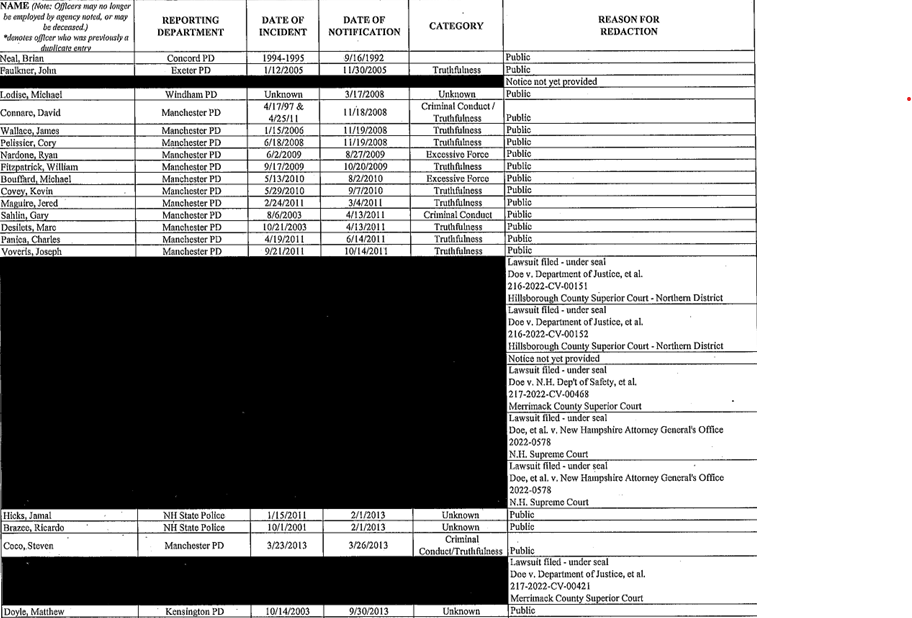The latest list of of police officer’s names on the Exculpatory Evidence Schedule, also called the Laurie List: https://www.doj.nh.gov/sites/g/files/ehbemt721/files/files/july-3-2024-ees-list.pdf
By DAMIEN FISHER, InDepthNH.org
CONCORD – Chief Justice Gordon MacDonald said his colleagues on the New Hampshire Supreme Court are wrong in their decision to give a hearing to cops who admit lying.
Three retired New Hampshire State Troopers admit they submitted bogus activity logs by inflating the number of traffic stops they initiated but appealed a lower court ruling that kept them on the state’s Exculpatory Evidence Schedule(EES), also known as the Laurie List.
This week, a majority of the Supreme Court reversed the lower court’s ruling and sent it back to Superior Court for a hearing on the troopers’ EES challenge. But MacDonald, the lone dissent, said his colleagues are ignoring the law as written.
“I find no error with the trial court’s conclusion that the plaintiffs’ admitted conduct is potentially exculpatory,” MacDonald wrote.
Exculpatory evidence is evidence that is favorable to a defendant and the U.S. Constitution requires it be turned over to the defense before trial.
The troopers, all now retired, admit that about 20 years ago they submitted bogus activity logs that added phantom traffic stops in order to reach their minimum quotas.
“For example, the plaintiffs recorded ‘rolling stops’ when they observed a ‘minor equipment violation’ that required the trooper to check the validity of the vehicle owner’s driver’s license, but which did not involve a stop of the driver’s vehicle. The plaintiffs also recorded traffic stops if they were the backup officer responding to a traffic stop initiated by another trooper,” court records state.
The troopers were caught and disciplined. As a result they were all put on the EES, but kept their jobs. However, their conduct violations were later deemed to be “not exculpatory, and did not require disclosure for impeachment purposes” by a district court judge. About a year later, the troopers’ names were removed from the EES.
“However, more than ten years later, the plaintiffs ‘heard rumors’ that their names were reinstated on the ‘Laurie List.’ Then, in September 2021, the plaintiffs were notified that their names were in fact included on the EES.”
A law change in 2021 allowed law enforcement officers on the list to appeal in Superior Court to get their names removed before their names would be made public.
The troopers challenged their placement in a sealed lawsuit, but a superior court judge dismissed their case ruling their actions met the legal definition of “potentially exculpatory.”
The troopers claimed in their challenge they did not intentionally lie in their activity logs, but thought counting incidents like phantom stops was allowed. The majority Supreme Court opinion states the troopers should get a hearing on whether or not their bogus logs were intentional lies.
‘[W]e conclude that, based upon the record before us, it cannot be determined that the plaintiffs knowingly submitted activity logs with false information or that the plaintiffs acted dishonestly,” the majority states.
“In conclusion, we reverse the trial court’s order granting the defendants’ motion to dismiss and remand for further proceedings consistent with this opinion to determine whether the plaintiffs’ conduct is potentially exculpatory,” the order states.
It was a majority of 3 to 1 with Justice Patrick Donovan writing the order and Justices James Bassett and Melissa Countway concurring and Chief Justice MacDonald dissenting.
The four justices made the decision in the usual five-member court. According to the ruling, Justice Gary Hicks and Justice Anna Barbara Hantz Marconi sat for oral argument, but did not participate in the final vote. Hicks retired last November.
Hantz Marconi has been on paid administrative leave since late July with no reason given.
MacDonald isn’t buying the majority argument, nor does he buy the troopers’ claim that the discipline is so far in the past it should not count.
“I am unaware of any legal basis to impose an expiration date on the potentially exculpatory fact that, for instance, an officer lied,” MacDonald wrote.
MacDonald states the troopers should go on the public EES like any other officer caught lying. Whether or not their discipline is disclosed to a defense attorney during a court proceeding, like a trial, is up to that particular trial judge, MacDonald wrote.
“[T]he plaintiffs’ admitted conduct is ‘potentially exculpatory’ within the meaning of the statute. Whether it would ever be admitted would, of course, be subject to the discretion of a judge presiding over a criminal trial,” MacDonald wrote.





